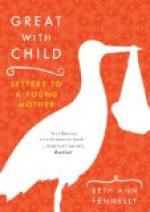“When milk will agree,” says Dr. Dewees, “there is no food so proper. It may be employed in any of its combinations, with good wheaten bread, rice, sago, &c., only remembering that when either of these articles is found to agree, it should be continued perseveringly, until it may become offensive. In this case, some new combination may be required.” I do not see the necessity of continuing one kind of food till it offends. Besides, I do not believe that these simple articles of food are apt to become offensive to stomachs that have not already been spoiled. But whether a single dish should or should not come to be offensive, I greatly prefer an occasional change.
Buchan, in his Advice to Mothers, has recommended it to them to boil bread for their infants, in water. It should not, for this purpose—nor indeed for any other—be new; it is best at one or two days, old. It may be boiled in a small quantity of water, or what is still better, of milk; or it may be steamed till it becomes soft and light, almost like new bread, but without any of the objectionable properties of that which is wholly new. To bread, thus prepared, is to be added a suitable quantity of milk, fresh from the cow, and a little diluted with water, but not boiled.
But as there may be, here and there, at any age, a stomach with which milk, with bread, or rice, or sago, will not agree—though I think they must be very rare cases—we may be allowed to substitute for it a solution of “gum arabic, in the proportion of an ounce to a pint of water,” to which may be added a little sugar; and if the child is old enough to observe the color, just milk enough to change the appearance. Another preparation for the same purpose consists of rennet whey, a little sweetened, and “disguised, if necessary, as just stated.”
The health of the mother, too, during the period of weaning, often needs great attention. Let her avoid medicine, however, if possible. A due regard to food, drink, exercise, and rest of body and mind, &c., will usually be found more effective, as well as more permanently efficacious.
SEC. 9. Food subsequently to Weaning.
You will allow me to introduce in this place, some of the sentiments of Dr. Cadogan, an English physician, from a little work on the management of children. [Footnote: Though Dr. C.’s remarks will apply more closely to England in 1750, they are by no means inapplicable to the United States in 1837.] I do it with the more pleasure because, though he wrote almost a century ago, he urges the same general principles on which I have all along been insisting: hence it will be seen that mine are no new-fangled notions. His remarks refer to the young of every age, but chiefly to early infancy and childhood. It will be found necessary, in some instances, to abridge, but I shall endeavor not to misrepresent the Doctor’s views.
* * * * *
“Look over the bills of mortality. Almost half of those who fill up that black list, die under five years of age; so that half the people that come into the world go out of it again, before they become of the least use to it or to themselves. To me, this seems to deserve serious consideration.




